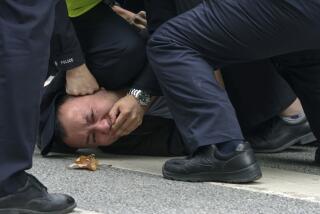Witnesses in Tibet tell of chaotic days
- Share via
BEIJING — A Chinese shopkeeper in Tibet’s capital came out of hiding Monday for the first time since mobs ransacked his herb store last week, during the biggest uprising against the region’s Chinese rulers in nearly two decades.
Ma Zhonglong, 20, said he had had nothing but a few packets of instant noodles to eat since he ran for cover Friday when he saw hundreds of Tibetans smash and burn storefronts near the Jokhang Temple, the religious and geographical heart of Lhasa.
“I went outside and saw people fighting on the street,” Ma said in a telephone interview. “I hurried back and closed the door. Through the glass window I could see the mob rushing toward me. They carried knives, stones, sticks. I ran farther back into this courtyard to hide. Outside I could hear them smashing everything.”
Monday morning, as Ma emerged and found his store in ruins and expensive herbs looted, the Chinese government had taken control of Lhasa and ordered all rioters to turn themselves in by midnight or face serious consequences.
A calm descended on the regional capital today after a week of protests that had turned violent and spread to three nearby provinces. Even the Chinese capital saw demonstrations, with dozens of students at the Central University for Nationalities gathered for a candlelight vigil amid heavy security.
Chinese authorities, weary of bad publicity in the run-up to the Beijing Olympics in August and eager to avoid any reminder of the violent 1989 crackdown on pro-democracy protests by students at Tiananmen Square, offered a portrait of official restraint during the effort to restore order in Lhasa. They blasted the Tibetan spiritual leader, the Dalai Lama, accusing him of fueling unrest.
“There is ample fact and plenty of evidence proving this incident was organized, premeditated, masterminded and incited by the Dalai clique,” Premier Wen Jiabao said today at a news conference. “This has all the more revealed the consistent claims by the Dalai clique that they pursue not independence but peaceful dialogue are nothing but lies.”
The Dalai Lama, a Nobel laureate who fled Tibet in 1959 after a failed uprising and runs an exile government in India, has denied any role in inciting the violence. He accused the Chinese government of cultural genocide in Tibet.
Champa Phuntsok, government chief in Tibet, who was in Beijing today attending the annual meeting of China’s parliament, denied that soldiers used lethal weapons or excessive force. Rioters, he said, set fire to more than 300 homes and shops, leaving at least 13 civilians dead and 61 police officers injured.
In one instance, Phuntsok told reporters, rioters doused a civilian with gasoline and set him on fire while others knocked out an officer and cut a piece of flesh from his buttocks.
Aides to the Dalai Lama have put the death toll at 80. There was no way to independently verify the conflicting tolls because Beijing forbids foreigners to visit Tibet without official permission.
Witnesses said Lhasa had been turned into a war zone, with both sides suffering casualties.
“I saw mayhem everywhere: Tibetans throwing rocks, setting fires, people running scared like cats and dogs,” said a 27-year-old migrant worker from Sichuan province, who was told to stay home by his employer. “The Tibetans were looking for Han Chinese to kill, adults and children.
“Somebody told me they suspended these Chinese schoolboys from the beams inside the Jokhang Temple, to protest, I guess,” said the worker, who requested anonymity and, like other Chinese in Lhasa, was interviewed by telephone.
“It was very scary,” said a 40-year-old Chinese man who works in a car dealership with an office near the temple. “There was fire and killing everywhere. When peace and stability is gone, ordinary people suffer.”
China’s critics blame the unrest and the underlying ethnic tension on what they call the Communist regime’s long-standing policy of cultural and economic strangulation.
“It’s normal for the Tibetans to hate the Chinese. You are on their turf, of course they hate you,” said the migrant worker from Sichuan.
Zhaxi Duoji is a Tibetan who runs the Tibet Cafe and Inn in southwestern China’s Yunnan province. He organizes regular tours to Tibet but has put them on hold since the disturbances began.
“I can say 90% of ordinary Tibetans are opposed to this kind of violence,” he said in fluent Mandarin, adding that he is a Buddhist and not a Communist Party member.
“The Chinese government’s policy on Tibet is improving,” he said. “Every country has a minority of people who want to go back to the past. That’s based on ignorance. Many Tibetans are disadvantaged because they don’t speak Mandarin, can’t express themselves and are easily taken advantage of by other people.”
It remains to be seen how hard Beijing will clamp down on the protesters today after the midnight deadline for turning themselves in. Meanwhile, extra security personnel have been deployed to other regions of western China with heavy Tibetan populations.
“I know the Communist Party will take care of everything by midnight and restore order,” the migrant worker said.
“But then again, how can we go back to normal with so many stores on so many streets burned and destroyed?”
--
More to Read
Sign up for Essential California
The most important California stories and recommendations in your inbox every morning.
You may occasionally receive promotional content from the Los Angeles Times.













